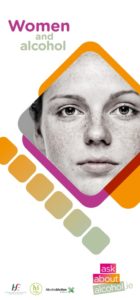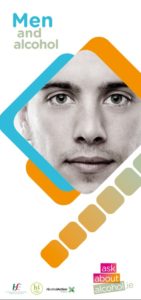Alcoholic beverages are commonly consumed in Irish society, and it is recognised as being part of our culture. Some of the benefits of alcohol are that it is used for socialising or winding down, and mild to moderate drinking usually causes no ill health effects. Recent times have seen an increase in the number of young people drinking, particularly heavy binge drinking, and increased alcohol consumption among women has also been noticed.
Safe Drinking limits
The recognised safe drinking limits are reported in units. These limits differ between men and women because even at the same weight, a woman will store a higher amount of alcohol in her body for the same amount of alcohol drunk as a man. The weekly limit for men is 21 units, and for women is 14 units. These limits should be considered as maximum safe limits, and some people may be more sensitive to the effects alcohol than others.
This drinking should be spread throughout the week rather than all in one go, and there should be at least 2-3 days of no drinking each week. Binge drinking should also be avoided if possible as this is more likely to cause damage to organs such as your brain and liver. Greater than eight units in one day for men and six units in one day for women is considered binge drinking.
The amount of alcohol in one drink varies depending on the strength of alcohol and the size of the measure. For example a pint of beer usually contains between 2-3 units of alcohol, while a standard 125ml glass of wine contains between 1.5-2 units. A bottle of table wine usually contains between 9-11 units of alcohol. A pub measure of spirits in Ireland contains approximately 1.25 units.
For more information on your drinking patterns, understand the risks and find out hwo much is too much visit the Ask About Alcohol website.
More information on the number of units in different drinks may be found on the RCPsych website.
Complications of Alcohol Use


When people start drinking alcohol it usually causes no problems; however, after a number of years of excessive use, alcohol can affect our health in many different ways. In the United Kingdom it is estimated that 1 in 3 men and 1 in 6 women have some sort of health problem caused by alcohol. We can divide alcohol health problems into physical, psychological and social.
Physical complications of alcohol include conditions such as stomach ulcers, liver failure, inflammation of the pancreas, and heart conditions. It is now recognised that just a few days of binge drinking can cause brain damage, and chronic heavy use of alcohol can lead to dementia. It is also recognised that chronic alcohol use can lead to worse hangovers, and it may take longer to recover from alcohol use over time.
Other people experience psychological effects from drinking, such as depression, anxiety, psychosis and memory difficulties. Alcohol is often used by people as a ‘crutch’ when they are suffering with low mood or experiencing severe life stresses. This can often seem as a good way of coping with life, however it is recognised that use of alcohol for this can lead to depression in the long term. It is also recognised that alcohol use can be the main cause of depression in some people, and when they stop drinking they notice an improvement in their mood.
Some people can suffer from social problems as a result of their drinking, such as relationship difficulties, financial difficulties and occupational problems. Alcohol dependence is a severe condition where drinking becomes part of someone’s daily routine. This condition can develop over time, and may be associated with many of the difficulties described above.
Reducing your drinking
If you wish to cut down your alcohol consumption but are finding it difficult, it may be worth discussing this with your General Practitioner, who could consider referring you to a counsellor or an addictions specialist. It could be worth keeping a drinking diary to monitor the amount of alcohol you are consuming each week so you are aware of situations where you may be drinking too much.
The following tips may help:
- Eat before drinking, because alcohol will have a stronger effect on you if you go out on an empty stomach.
- Avoid getting into large rounds when out drinking.
- Drink at the same pace as the slowest drinker in the group rather than the fastest drinker.
- Take sips of alcohol instead of gulps.
- Drink a non-alcoholic beverage between drinks. This could be a non-alcoholic beer or a glass of water.
- Offer to be the designated non-drinking driver when attending social events.
- Consider discussing your worries about the effects alcohol is having on you with your friends or with someone in your group of friends who you trust. You may be surprised that you are not the only one in your group who has worries about the effects alcohol is having on you.
- Be aware of the amount of wine poured in a glass, and ask for a small glass if possible. In order to keep aware of how much alcohol you are consuming, finish your drink completely before accepting a re-fill.
If used responsibly drinking alcohol can provide much enjoyment and complement our social lives. Awareness of the safe use of alcohol is important so that risk of the complications of alcohol described above will be low, and alcohol can be used with enjoyment for many years.
More information may be found here:


